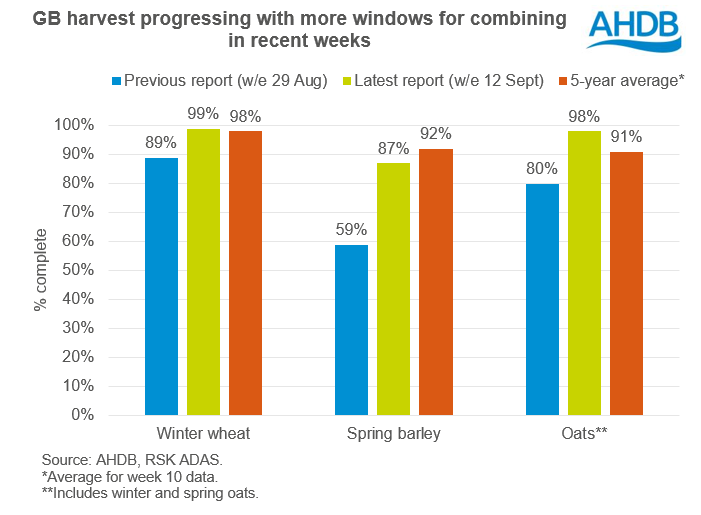GB harvest progress boosted by dry spell: Grain market daily
Friday, 15 September 2023
Market commentary
- UK feed wheat futures (Nov-23) closed yesterday at £190.50/t, up £2.75/t from the previous day's close. Nov-24 futures closed at £202.05/t yesterday, up just £1.50/t over the same period.
- Domestic futures followed price support on the continent yesterday, following a sharp drop in the euro against the US dollar and some dry weather concerns for southern hemisphere supply. Whereas US markets felt some pressure yesterday on expectations of strong exports of Russian grain this season.
- Paris rapeseed (Nov-23) futures found support yesterday, gaining €15.00/t to close at €446.25/t. Futures found support from rising Chicago soyabean futures and Malaysian palm oil.

Should farmers enter carbon markets?
Carbon markets are a relatively new entity, with a huge number of unregulated schemes available to farmers. The companies buying carbon and trading carbon credits know a great deal more about the value of carbon in the open market than farmers do. In economics, this is known as ‘asymmetry of information’, this is concerning. In any market, if the buyer knows more than the seller, or vice versa, the market is likely to be distorted and the price may well favour the party with the knowledge.
That said, there are many reasons why farmers are increasingly finding carbon markets attractive.
Sarah Baker, Head of Economics Analysis at AHDB, explores the question of entering carbon markets in detail.

GB harvest progress boosted by dry spell
Recent hot and dry weather spells for many regions have provided good windows of opportunity for harvesting in the past two weeks.
The latest AHDB GB harvest report was released today, using data to week ending 12 September These show both the GB winter barley and winter oilseed rape harvests as now complete, with winter wheat harvest 99% complete.
Spring barley was 87% complete to the week ending 12 September. This is a little behind the previous five-year average of 92%, but a jump up from 59% complete in the previous report a fortnight ago (week ending 29 August).
Oat harvest was 98% complete to 12 September, ahead of the 5-year average of 91%.
Though progress can be seen for many over the past few weeks, there are reports of green crops in some regions still, particularly for spring oats. Key regions with area still to be harvested are across the North East and Scotland.
With the improved weather seen over recent weeks, less grain drying has been reported over this period in some regions. Though, the morning dews have seen drying continue for some.
Straw yields have been variable across the regions and crop type, with late sown crops generally poor. A lot of straw has started to look weathered, although improved recent weather conditions provided good baling opportunities.
Quality in focus
Quality remains in focus considering the wet weather we have seen through most of the summer. Typical Hagberg falling numbers are now ranging between 200–220 nationally, in data to 12 September, with some regional variation. This is down from 220–250 in the last report a fortnight ago.
In the East Midlands, no mycotoxin issues have been reported for winter wheat. However, ergot has been present in some storage facilities, although this has generally been at low levels.
For barley, GB average germination data remains around 96–98%, in line with the last report, but varies by region. In Yorkshire, germination levels have been affected by wet weather pre-harvest. Rates of 90-95% are common and a key reason for malting rejections. Similarly in the West Midlands, quite a few crops have failed germination tests, with 96–98% common.
Spring crop yields slightly lower
Notably from the last report, the GB average yields for spring barley are lower. Now the current GB typical average is 5.3–5.7 t/ha, slightly down from the last report (using data to 29th August) at 5.5–5.9 t/ha. This range is now below the previous five-year average of 5.8 t/ha.
Grain yields have seen clear variation this season. Overall, crops grown on heavier land have yielded better. Sowing date too has been particularly important for spring crops.

Sign up for regular updates
You can subscribe to receive Grain Market Daily straight to your inbox. Simply fill in your contact details on our online form and select the information you wish to receive.
While AHDB seeks to ensure that the information contained on this webpage is accurate at the time of publication, no warranty is given in respect of the information and data provided. You are responsible for how you use the information. To the maximum extent permitted by law, AHDB accepts no liability for loss, damage or injury howsoever caused or suffered (including that caused by negligence) directly or indirectly in relation to the information or data provided in this publication.
All intellectual property rights in the information and data on this webpage belong to or are licensed by AHDB. You are authorised to use such information for your internal business purposes only and you must not provide this information to any other third parties, including further publication of the information, or for commercial gain in any way whatsoever without the prior written permission of AHDB for each third party disclosure, publication or commercial arrangement. For more information, please see our Terms of Use and Privacy Notice or contact the Director of Corporate Affairs at info@ahdb.org.uk © Agriculture and Horticulture Development Board. All rights reserved.


